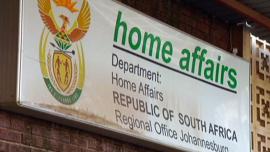
The Department of Home Affairs has issued the first-ever South African marriage certificates officially recognising the “type of marriage” as “Muslim”.
After changes were made to the department’s internal systems, Home Affairs has granted the first batch of 33 marriage certificates for Muslim marriages for the first time in the South African history.
“Members of the Islamic faith community have made extraordinary contributions to South Africa’s history for more than 350 years,” said Home Affairs Minister Dr Leon Schreiber.
“While it comes hundreds of years later than it should have, it is a personal honour for me to preside as Minister over the granting of marriage certificates recognising Muslim marriages.
“This is a major step towards enhancing the dignity of this faith community and reflects the ongoing commitment of Home Affairs to deliver dignity to all our valued clients. It is also an expression of nation building, and a celebration of South Africa’s unity in diversity,” Schreiber said.
He said Home Affairs stands ready to assist all clients who similarly wish to have a Muslim marriage formally recognised.
"Additionally, we have enabled our systems to retroactively recognise Muslim marriages. At a fee of R20, clients can request a reprint of their marriage certificate specifying that they wish to change the wording to reflect that it is a Muslim marriage,” the Minister said.
Divorce Amendment Act
In May, President Cyril Ramaphosa signed into law the Divorce Amendment Bill, which amends the Divorce Act of 1979 to recognise Muslim marriages and safeguard the interests of Muslim women and children of Muslim marriages in the event that marriages are dissolved.
The amended legislation addressed shortcomings in the Divorce Act of 1979, which differentiated between people married in terms of the Marriage Act and people married according to Muslim rites, especially women.
The amendments enacted by the President provided for a definition of a Muslim marriage in the Divorce Act of 1979; the protection and safeguarding of the interests of dependent and minor children of a Muslim marriage; the redistribution of assets on the dissolution of a Muslim marriage and forfeiture of patrimonial benefits of a Muslim marriage, according to a statement issued by The Presidency at the time.
It said the new legislation was a response to an earlier Constitutional Court judgment that recognised the need for and importance of protecting Muslim women and children of Muslim marriages, particularly when a Muslim marriage is dissolved.
For more information on the Divorce Amendment Act 1 of 2024 go to https://www.gov.za/documents/acts/divorce-amendment-act-1-2024-english-afrikaans-14-may-2024. – SAnews.gov.za


